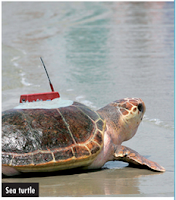On pages 50 and 51, we read and made inferences from the article "How Do Animals Navigate?", so we have read it very carefully to understand the ideas. Now, we want to reflect critically on it.
_______________________________________
As usual, Bixby and Scanlon give some specific questions to help us develop our critical thinking skills (p. 52).
- Some sea turtles have been hunted for their meat and their shells for centuries. How can a better understanding of how turtles navigate help us protect these turtles?
(Peter's first thought here was: should we protect them? Why not use our understanding to hunt them more efficiently?)
- Homing pigeons apparently use roads and highways to navigate. What other animals might also do this? What problems might this cause?
For ten minutes, write down your ideas in response to these questions.
___________
Reference

A better understanding of how turtles navigate can help us protect them in a couple of ways. First, we can warn ships that might endanger the turtles to avoid their navigation paths. Also, we can track the turtles to protect them from hunters who want them for food or accessories such as bags and glasses frames. When i was a child, turtle shell glasses frames were very hi-so. But I only ever got cheap plastic imitations!
ReplyDeleteAs my comment suggests, I'm not sure it's obvious that we should protect the turtles. Or maybe I do agree with that. Protect could also be protect them so that their numbers do not decline. In turn, this will allow regular, sustainable hunting. It's hard to see how this could be any more wrong than killing pigs, dogs, chickens or elephants for food and leather. The usual argument for banning hunting of animals such as whales is that they are endangered, which might be a reasonable argument (I'm not sure), but if we use our understanding of the animals habits to maintain a constant number with hunting allowed up to a certain number, that argument for banning hunting disappears. Perhaps permits could be given (better = sold) to hunters to kill a certain number at certain places. We could then use our knowledge of the animal's navigation habits to monitor and enforce the licences. This would also give the animals greater commercial value, so the people who have paid for licences to kill will be motivated to protect their investment by reporting illegal hunters. And people who enjoy turtle soup, elephant ivory and other valued animal products will be able to indulge their lusts at great expense, as they already do in ways that harm the protected animals.
It was an interesting question.
we should protect sea turtles because we can study them by other methods such as GPS tags. we do not necessary hunting.
ReplyDeleteOther animals should use roads and highways to navigate because this practice can help them save time to travel. However, that may cause of problem to human. If animals use roads and highways more than now, they may make travel accidents with human.
I thought that turtle should be protected. It's normal for hunting turtles; however, it should be better if we have some method to protect them. Because ecosystem will be lose balance, if we don't have turtles.
ReplyDeleteSea tutles use Earth's megnetic field and sometimes smell to navigate. Thus, I think that tutlle might smell hunter's meal to avoid hunter sea tutles.
ReplyDelete